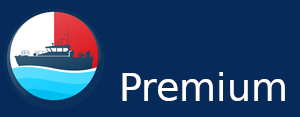"The only proven way young people will get to know their job and environment is learning while doing". That's the verdict of the Irish Nautical Trust's Jimmy Murray, who has launched a new River Liffey-based maritime training course on the capital's waters.
The community initiative sponsored by Google began this year and had the dual mandate of preserving the area's nautical heritage and creating long-term sustainable employment in the Dublin Port and Docklands.
"We are hopeful that doing this will help those who come on board to obtain a certified level of maritime skills to enable them to gain sustainable employment in the maritime industry", Murray told Afloat.
The Trust aims to put up to 75% of its trainees in permanent employment within local maritime companies, with a further 15% going on to further maritime education.
"The objective of our project is to create a maritime training programme to educate local unemployed people so they can attain a certified level of employment in the marine industry at Ireland's busiest port", Murray says.
There are no existing solutions to supply a certified workforce for maritime employment opportunities in Dublin Port.
Historically, maritime knowledge in the port has passed down between generations, and Murray hopes to keep this tradition alive by adding commercial certification for its course graduates.
The courses run by the Trust and supported by the Dublin Port Company are, according to Murray, unique to the Liffey environment and the Dublin Port area.
Seafaring technicians from the local area as well as external contractors approved by the Marine Survey Office (MSO), Royal Yachting Association (RYA) and Irish Sailing (ISA) will carry out the courses over a series of different modules.
Courses in 2022
The aim is to operate three courses in 2022. Each course will be carried out over 14 weeks under the Nautical Trust's Head instructor, Jimmy Dent.
Students do not require any educational qualifications or previous marine experience before joining the course, but Safe Pass and Manual Handling certification are required before the course starts.
The plan is for the courses to provide opportunities on the Liffey similar to what is available at the Maritime College in Cork and the Seamanship Centre in Donegal.
The experience gained from the introductory Marine Training Programme will give trainees the foundations to seek employment in the marine industry and prepare them to advance into further marine education.
Seafaring
Course modules will include an introduction to Dublin Port and a code of practice for anyone involved in dock work. There will also be classes on seamanship, navigation and pilotage, as well as marine engine and hull maintenance.
An introduction to powerboating will demonstrate safe boat handling for Irish waters and the course includes a period of practical workboat experience on the river.
The skills learned are essential for anyone considering a career on any boats that ply the Liffey, such as tour, cruise and ferry boats. Workboats such as tugs and pilot boats and educational boats such as training vessels.
"We hope to establish a working relationship with marine businesses by creating a linked work experience programme with the many companies that already operate within the port", Murray says.
At the end of five years, Murray says he expects the Trust will have graduated a minimum of 120 students into full-time employment or further education in the maritime sector.
In the future, Murray also hopes the training model will go beyond the Dublin Docklands and grow to include other communities throughout Ireland that wish to embrace this type of training.
Irish Nautical Trust Maritime Training Entry Requirements
• Minimum 18 years of age
• Not in full-time education
• Genuine interest in pursuing a career in the maritime sector
• Ability to work as part of a team
• Working knowledge of the English language
• Standard Medical fitness to include an eye test including colour vision
Courses began in February 2022. Contact Irish Nautical Trust at training@irishnauticaltrust.ie or call 01- 66 88 113


